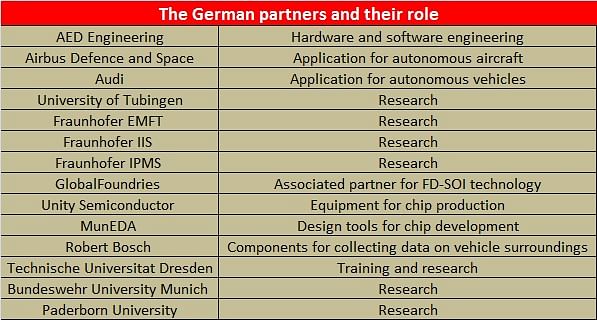Global Research alliance develops sensor systems for autonomous driving and flight
A new semiconductor production method aims to maximise energy efficiency while using components with advanced computing power. The innovative microelectronics cut energy consumption by 90 percent.
German Tier 1 Bosch the German consortium leader of the publicly funded OCEAN12 — Opportunity to Carry European Autonomous driving further with FD-SOI technology up to 12nm node — project with 27 partners across Europe, 14 of them in Germany, have developed a new semiconductor production method that aims to maximise energy efficiency while using components with advanced computing power.
Bosch says the mobility options in cities are becoming more and more diverse. People go by foot, bike, or e-bike, take buses, trams, or trains, drive their own cars, and in the future will even travel in driverless cars. There are also new options for flight: in conurbations, autonomous flying taxis or drones could transport people or time-critical goods and medications. All these applications require powerful sensors and control systems that save as much energy as possible. This is precisely where the publicly funded OCEAN12 project comes in – a pan-European collaboration of 27 partners from the fields of semiconductor technology, electronics, aerospace technology, and automotive technology. Bosch is heading the German consortium, which consists of 14 organisations. The project partners will be working together up until the end of 2021 to develop various especially energy-efficient components that can collect and process data from the surroundings of vehicles and aircraft. These include surround sensors such as cameras and LiDAR or radar sensors, as well as microprocessors for processing data. The electronics translate the collected data into commands for downstream components – for example, braking or steering a car or controlling the propulsion of a flying taxi.
Comprehensive research needed
Development in the OCEAN12 project is based primarily on Fully Depleted Silicon On Insulator (FD-SOI) technology from the OCEAN12 project partner GlobalFoundries. This method of semiconductor production involves adding an ultrathin layer of insulator to reduce what are called leakage currents, resulting in lower energy consumption and higher computing speed. Based on this technology, the research alliance partners can subsequently develop components that offer an optimum combination of maximum energy efficiency with advanced computing power.
Dr. Tilman Glokler, coordinator of the German OCEAN12 and part of Bosch, said: “The OCEAN12 project’s objective is to ensure that new sensor systems for future mobility concepts consume up to 90 percent less power than today’s systems.”
In addition, the new technology makes it possible to build particularly small sensor systems, as sensors containing high-performance evaluation circuits can be integrated as a system on a chip (SoC). “Energy-saving sensor systems are indispensable for automated driving and flying. As we apply our expertise in microelectronics to the OCEAN12 project, we are gradually moving closer to this goal,” adds Glokler.
Funding for the OCEAN12 project (worth 103.58 million euros or Rs 810 crore) comes from the European Union and national organisations. In Germany, the Federal Ministry of Education and Research and the state of Saxony provide financial support. Together, all the sponsors will contribute some 48 million euros (Rs 375 crore) over the course of the project from mid-2018 to the end of 2021. The German consortium includes Airbus, Audi, Bosch, and GlobalFoundries as well as numerous SMEs, research institutes, and universities.

RELATED ARTICLES
Autoliv Plans JV for Advanced Safety Electronics With China’s HSAE
The new joint venture, which is to be located strategically near Shanghai and close to several existing Autoliv sites in...
JLR to Restart Production Over a Month After September Hacking
Manufacturing operations at the Tata Group-owned British luxury car and SUV manufacturer were shut down following a cybe...
BYD UK Sales Jump 880% in September to 11,271 units
Sales record sets the UK apart as the largest international market for BYD outside of China for the first time. The Seal...






 By Autocar Professional Bureau
By Autocar Professional Bureau
 25 Sep 2019
25 Sep 2019
 6860 Views
6860 Views





 Ajit Dalvi
Ajit Dalvi




